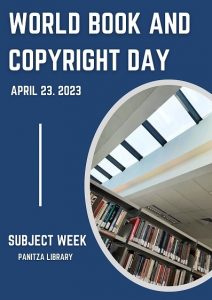
Print Books:
- Adler, M. J., & Van Doren, C. (2014). How to read a book: The classic guide to intelligent reading. Simon and Schuster. PN83 .A43 1992
- Baldwin, P. (2016). The copyright wars: Three centuries of trans-Atlantic battle. Princeton University Press. K1420.5 .B359 2014
- Brennan, T. J. (2020). Who Owns the News? A History of Copyright. Stanford, California : Stanford University Press. Z652.N4 S57 2019
- Carrière, J. C., & Eco, U. (2011). This is not the end of the book: A conversation curated by Jean-Philippe de Tonnac. Random House. Z1003 .C27 2012
- Johnson, A. (2018). Book towns: Forty five paradises of the printed word. London, United Kingdom : Frances Lincoln. Z1003.5 .J65 2018
- Kells, S. (2017). The library: a catalogue of wonders. Melbourne, Vic.: Text Publishing. Z665 .K45 2017
- Lastowka, G. (2010). Virtual justice : The new laws of online worlds. Yale University Press. K564.C6 L374 2010
- Palfrey, J. (2015). BiblioTech: Why libraries matter more than ever in the age of Google. Basic Books, Perseus Books Group. Z674.75.I58 P38 2015
- Raustiala, K., & Sprigman, C. (2012). The knockoff economy : How imitation sparks innovation. Oxford University Press. KF3080 .R38 2012
- Vaidhyanathan, S. (2001). Copyrights and copywrongs : The rise of intellectual property and how it threatens creativity. New York. Z642 .V35 2001
When off campus, please enter your credentials to access e-books and articles.
E-books:
- Gillespie, T. (2007). Wired Shut : Copyright and the Shape of Digital Culture. MIT Press. (ProQuest Ebook Central)
- Goldstein, P. (2001). International copyright: principles, law, and practice. Oxford University Press, USA.(EBSCOhost)
- McCrossan, J. A. (2000). Books and Reading in the lives of notable Americans: A biographical sourcebook. Greenwood Publishing Group.(ProQuest Ebook Central)
- Mendis, S. (2011). Copyright, the Freedom of Expression and the Right to Information. Nomos ; Munich.(JSTOR)
- Rayner, K., Pollatsek, A., Ashby, J., & Clifton Jr, C. (2012). Psychology of reading. New York: Psychology Press.(ProQuest Ebook Central)
- Rife, M. C. (2013). Invention, copyright, and digital writing. SIU Press.(ProQuest Ebook Central)
- Rennison, N. (2008). 100 Must-read Life-changing Books. A&C Black.(ProQuest Ebook Central)
- Rog, L. J. (2012). Guiding readers: Making the most of the 18-minute guided reading lesson. Pembroke Publishers Limited.(ProQuest Ebook Central)
- Simms & Marzano. (2018). The new art and science of teaching reading. Bloomington, Indiana. (ProQuest Ebook Central)
- Spacks, P. M. (2011). On rereading. Harvard University Press.(EBSCOhost)
Articles:
- Gross, E.-C. (2020). Photography and Intellectual Property: Are Creators Protected by Law? Saeculum, 50(2), 50–61.
- Vică, C., & Socaciu, E.-M. (2019). Mind the Gap! How the Digital Turn Upsets Intellectual Property. Science & Engineering Ethics, 25(1), 247–264.
- Neill, A., & Lee, E. (2019). Fixing Copyright Registration for Online Video Creators: The Case for Group Registration of Published Videos. Texas Intellectual Property Law Journal, 28(1), 87–98.
- Fredriksson, M. (2018). A critical guide to intellectual property. International Journal of Cultural Policy, 24(4), 559–561.
- Larrea, C., & Weedon, A. (2007). Celebrating Book Culture: The Aims and Outcomes of UNESCOs World Book and Copyright Day in Europe. Publishing Research Quarterly, 23(3), 224–234.
You can see also libguide Scholarly Writing. It provides faculty and students with assistance and resources on scholarly communication and publications.





